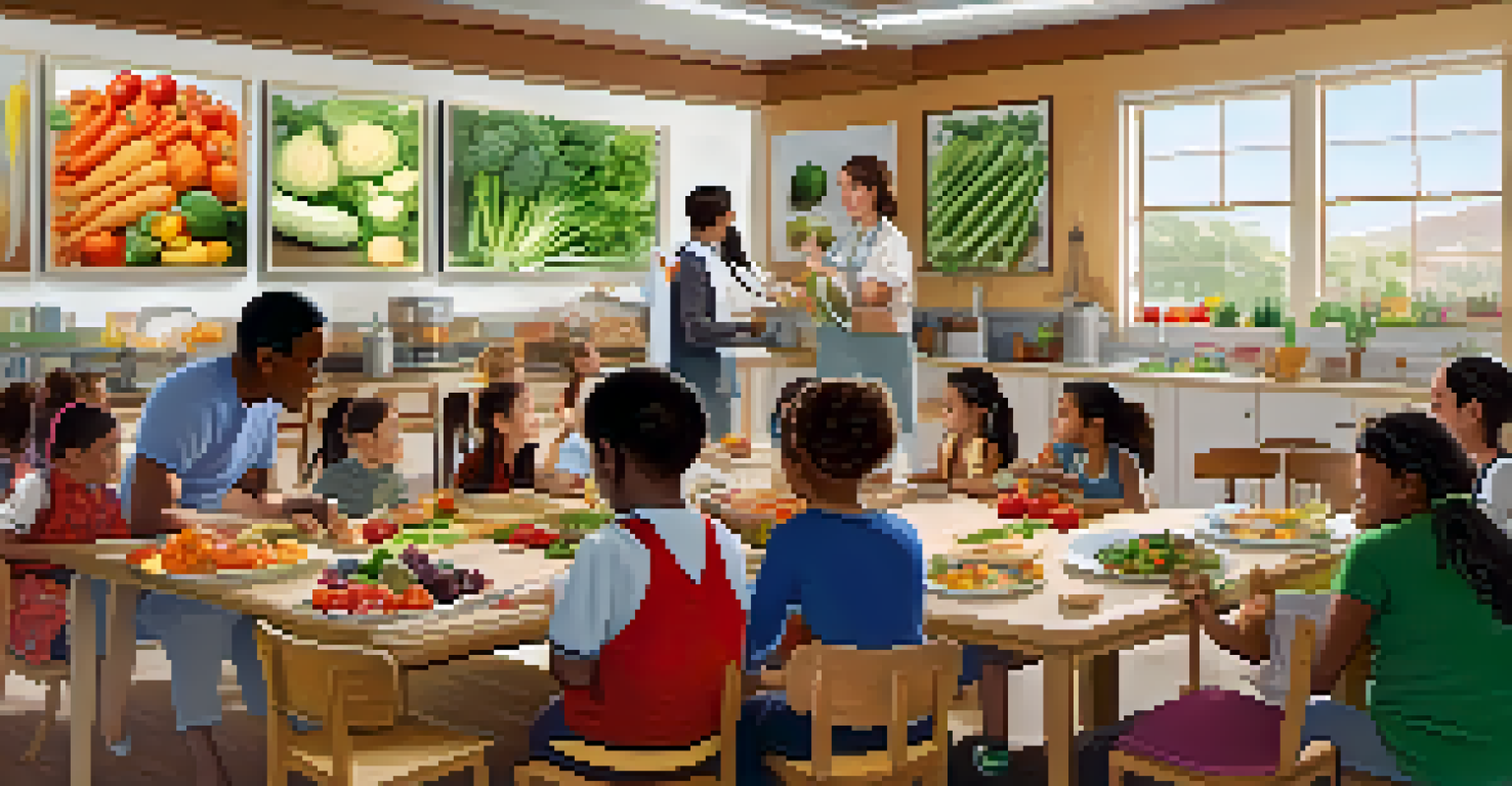Nutrition Education Initiatives in Big Bear Communities

Understanding Nutrition Education in Big Bear
Nutrition education is vital for fostering healthier lifestyles in communities like Big Bear. It involves teaching individuals about the importance of nutrition and how it affects their overall well-being. By providing accessible information, residents can make informed dietary choices that lead to better health outcomes.
Let food be thy medicine and medicine be thy food.
In Big Bear, the focus on nutrition education aligns with the community's commitment to wellness and sustainability. Initiatives are designed to empower residents with knowledge about local food systems, seasonal eating, and the benefits of whole foods. This educational approach not only improves personal health but also strengthens community bonds.
Ultimately, understanding the basics of nutrition lays the foundation for a healthier community. By engaging residents in meaningful discussions about food and health, Big Bear can foster a culture of wellness that positively impacts everyone. This foundational knowledge is essential for ongoing nutrition initiatives.
Local Programs Promoting Healthy Eating
In Big Bear, several local programs focus on promoting healthy eating among residents. These initiatives often include cooking workshops, nutrition classes, and community gardens, making healthy food options more accessible. By involving the community, these programs encourage participation and foster a sense of ownership over personal health.

For example, local schools might host nutrition workshops that teach students about balanced diets and the importance of fruits and vegetables. These sessions not only educate children but also encourage families to adopt healthier eating habits together. This community-centered approach ensures that nutrition education resonates with all age groups.
Nutrition Education Boosts Health
Nutrition education empowers Big Bear residents to make informed dietary choices, improving overall health and community well-being.
Moreover, partnerships with local farmers and businesses enhance these programs by providing fresh produce and resources. By collaborating with local entities, these initiatives can better meet the unique needs of the Big Bear community, promoting sustainable eating practices that benefit both individuals and the environment.
The Role of Schools in Nutrition Education
Schools play a crucial role in nutrition education, particularly in communities like Big Bear. By integrating nutrition into the curriculum, educators can instill lifelong healthy habits in students. This not only impacts their individual health but also influences their families and peers, creating a ripple effect of positive change.
You are what you eat, so don’t be fast, cheap, easy, or fake.
Programs like farm-to-school initiatives bring fresh, local produce into cafeteria meals, teaching children about healthy food choices. Students learn where their food comes from and how to make nutritious meals, fostering a deeper appreciation for healthy eating. This hands-on approach makes nutrition education engaging and memorable.
Additionally, schools can host events that involve parents and the wider community, such as health fairs or cooking demonstrations. These events can serve as platforms to share nutrition information and resources, ultimately fostering a supportive environment for healthy living. The involvement of schools in nutrition education is pivotal in shaping future generations.
Community Gardens: A Hands-On Approach to Nutrition
Community gardens in Big Bear offer a unique, hands-on approach to nutrition education. These gardens not only provide fresh produce but also serve as educational hubs where residents can learn about gardening, healthy eating, and sustainable practices. By working together, community members cultivate both food and relationships.
Participating in a community garden allows individuals to connect with nature and understand the importance of growing their own food. This experience can inspire healthier eating habits, as people are more likely to incorporate fresh vegetables into their diets when they have a personal connection to them. Plus, gardening can also be a therapeutic activity that promotes mental well-being.
Community Programs Encourage Eating Well
Local initiatives like cooking workshops and community gardens promote healthy eating habits and foster a sense of ownership among residents.
Moreover, community gardens often host workshops and events focused on nutrition education. These gatherings provide a space for sharing knowledge about cooking with fresh produce, preserving food, and understanding nutrition labels. Through these initiatives, Big Bear residents can learn valuable skills that directly impact their health and well-being.
Engaging Families Through Nutrition Workshops
Nutrition workshops aimed at families are an effective way to promote healthy eating habits in Big Bear. These workshops often include interactive cooking classes and discussions about meal planning, making nutrition education fun and approachable. Engaging families fosters a supportive environment where everyone can learn together.
By focusing on practical skills, families can gain confidence in preparing healthy meals at home. This not only improves their diets but also strengthens family bonds as they cook and eat together. The shared experience of learning about nutrition can lead to lasting changes in how families approach food.
Additionally, these workshops can introduce families to local resources, such as farmers' markets and community-supported agriculture (CSA) programs. By connecting families with these resources, they can access fresh, affordable food while also supporting local businesses. This holistic approach to nutrition education creates a healthier community overall.
The Impact of Local Farmers on Nutrition Education
Local farmers play a significant role in nutrition education initiatives in Big Bear. By partnering with schools and community programs, they can provide fresh produce and share their knowledge about sustainable farming practices. This connection between farmers and the community fosters a deeper understanding of food sources and nutrition.
Farmers can also participate in workshops and events to educate residents about the benefits of seasonal eating and local foods. By highlighting the nutritional value of fresh, locally grown produce, they encourage healthier eating habits. This kind of engagement helps bridge the gap between food production and consumption.
Schools Shape Future Nutrition Habits
Schools in Big Bear play a crucial role in instilling lifelong healthy habits through integrated nutrition education and community events.
Moreover, supporting local farmers through community programs strengthens the local economy. When residents choose to buy from local sources, they not only access fresh food but also contribute to the sustainability of their community. This symbiotic relationship between farmers and residents enhances the overall nutrition education landscape in Big Bear.
Challenges Facing Nutrition Education in Big Bear
Despite the numerous initiatives in Big Bear, challenges still exist regarding nutrition education. Access to resources and information can be limited, especially for low-income families. These barriers can hinder the effectiveness of nutrition programs and prevent some community members from benefiting fully.
Additionally, misinformation about nutrition can spread easily, leading to confusion about healthy eating. It's crucial for nutrition education initiatives to address these misconceptions and provide accurate, evidence-based information. Clear communication is key to ensuring that community members can make informed dietary choices.

Lastly, sustaining engagement in nutrition education programs can be a challenge. Community interest may wane over time, making it essential for initiatives to continually evolve and adapt. By addressing these challenges head-on, Big Bear can strengthen its nutrition education initiatives and create a healthier, more informed community.
Looking Ahead: The Future of Nutrition Education
The future of nutrition education in Big Bear looks promising, with a growing emphasis on community involvement and sustainable practices. As more residents become aware of the importance of nutrition, there is potential for increased participation in local programs. This shift could lead to a stronger culture of health and wellness throughout the community.
Innovative approaches, such as integrating technology into nutrition education, may also play a role in reaching a wider audience. Online resources, virtual workshops, and social media campaigns can complement traditional methods, making nutrition information more accessible. Embracing these advancements can enhance engagement and facilitate learning.
Ultimately, the goal is to create a supportive environment where nutrition education thrives and becomes an integral part of community life. By continuing to invest in these initiatives, Big Bear can inspire residents to prioritize their health and well-being, paving the way for a healthier future for all.